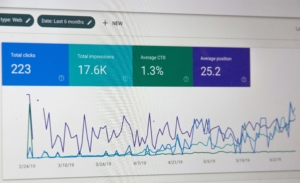When people feel sick, they don’t call your office first, they Google it. They’re looking up symptoms, treatments, and local doctors they can trust. If your practice isn’t showing up in those search results—whether it’s through blogs, service pages, or FAQs—you’re losing out on reaching potential patients. Even the best doctors stay invisible online without solid SEO. People want fast, reliable answers, not the hassle of making calls. That’s where a medical practice SEO consultant steps in; getting your practice in front of the patients who need you most.
They know SEO inside and out and get what it takes to stand out in healthcare marketing. In this blog, we’ll dig into the SEO hurdles medical practices face and how the right expert can help you handle them. From boosting your local search rankings to crafting content that speaks to your patients, we’ll break down the strategies that can bring more traffic. These tactics will help build trust and grow your practice in today’s competitive online space.
 Why Does SEO Matter for Medical Practices?
Why Does SEO Matter for Medical Practices?
Your online presence says a lot about you as a healthcare provider. Patients want clear, reliable info about your services, your approach to care, and what to expect when they visit. If they can’t find you online, or your website feels outdated or confusing, they’ll likely move on. Even if you’re the only cardiologist in town, people might head to a bigger city if they can’t easily find the information they need about your practice.
I get it. SEO can sound like just another marketing gimmick. But it’s more than that. It helps patients connect with doctors who specialize in exactly what they need, and it also keeps healthcare professionals accountable. A solid SEO strategy pushes you to keep your site updated with accurate info, answer the questions patients are actually asking, and make it easy for them to trust your expertise. When done right, SEO doesn’t just boost rankings; it creates a trusted bridge between you and the people searching for your care.
Building Credibility Through SEO
Yes, as wild as it sounds, SEO can help establish your credibility with Google and potential clients. However, I understand that the idea of people turning to Google to find doctors probably wasn’t something covered in undergrad, med school, rotations, or even your residency. While insurance panels remain an important factor, what do you think people do as soon as they get a list of names? They start looking them up. They want to know more: do these doctors really specialize in Women’s Health, or is that just an overly broad description from the hospital? Are they truly as compassionate and skilled as their bio suggests?
With SEO, your website can be the first resource potential clients find instead of ZocDoc or patient review sites. Or if they do go to Google first and insurance review last, that works for you too. SEO allows you to control the narrative, showcasing who you are, what you specialize in, and how you work with patients. It gives you a platform to share not just logistical information like whether you take insurance, but also create content that answers deeper questions your patients may have. Writing informative pages and blogs lets you demonstrate your expertise and build trust, drawing people in with helpful, accessible answers to what they’re searching for. With SEO, you’re not leaving your credibility entirely in the hands of third-party sites; you’re taking an active role in earning that trust directly.
What are the Common SEO Challenges Doctors and Clinics Face?
One of the biggest challenges many doctors and clinics face with SEO is finding time to focus on it while managing a busy practice. When do you really have time to learn about SEO let alone implement it? Let’s be honest: between seeing patients, handling administrative tasks, and staying updated on the latest medical advancements, optimizing a website can feel overwhelming, or even impossible. Additionally, understanding the technical aspects of SEO can be really intimidating if you don’t have a background in digital marketing.
So what even is “SEO” supposed to mean? And why does everyone keep saying things like “algorithms, backlinks, and rankings”? They’re niche terms that can make anyone’s head spin. Yet, these strategies are key to helping your practice stand out online and connect with the patients who need you most.
 1. Generic, Patient-Unfriendly Website Copy
1. Generic, Patient-Unfriendly Website Copy
You’ve spent years diving into textbooks, research papers, and studies—you know how to cut through complex info fast. But here’s the thing: writing for patients isn’t the same as writing for peers. As a healthcare professional, it’s tempting to use technical terms and jargon because that’s your world. The problem? Your patients don’t speak that language.
When people look for care online, they’re not searching for complicated medical terms, they’re thinking about their symptoms and how they feel. If your site is too technical or hard to follow, they’ll leave. Patients are already vulnerable when seeking healthcare. They want to feel understood, not overwhelmed or intimidated. So how can you make sure your content is easily digestible for your patients? Write your content as if you were explaining it to a friend or family member while still ensuring you’re providing accurate and reliable information.
2. Lack of Local Optimization
Healthcare is all about being local. Patients need providers in their area, yet so many practices miss out by overlooking local SEO. Just sprinkling your city name on your homepage isn’t going to cut it. If you’re not implementing local SEO, you’re not just missing opportunities, you’re actively doing your practice and your Google Business Profile (GBP) a disservice. Here’s the thing: Google needs to trust that you’re the local expert. If your website isn’t clear about where you’re located, it’s going to favor someone who proudly states where they work.
And patients? They’re not going to dig through your site to figure out where you are. They’ll just move on to the next provider who makes that information obvious. To stand out in local search, you need dedicated pages for every location you serve, an optimized Google Business Profile with accurate details and regular updates, and keywords that include your city, neighborhood, or region. Don’t underestimate the power of consistent business info across all directories either; these details make all the difference in getting found and trusted by both Google and patients.
3. Weak Technical SEO and Site Structure
Technical issues on your website can tank your search rankings, no matter how great your content is. Think about it: slow load times, clunky navigation, or a site that doesn’t work well on mobile? It’s all a recipe for frustration, and search engines notice. Broken links, for example, aren’t just bad for functionality; they ruin the user experience too. No one’s going to chase down a dead link to find what they need. You wouldn’t either, so why expect your visitors to? And let’s be real, most people are searching on their phones. Why drag out a desktop when your phone does the same thing? If your site isn’t optimized for mobile, that’s a massive red flag.
If it looks sketchy or cluttered in mobile view, your potential visitor will hit the back button faster than… well, you get the idea. Another thing: vague, generic page names don’t help anyone. Having one bloated page crammed with “all services” isn’t just overwhelming; it’s unhelpful. Clear, focused page names and organized content make it easier for users, and search engines, to understand what you offer. A clean, functional, and mobile-friendly website isn’t just good for SEO. It’s the key to keeping visitors engaged and turning them into patients.
4. No Strategy Behind Content
Many practices create content randomly, posting blogs whenever there’s time, without focusing on what patients are actually searching for. This often leads to generic content about industry updates or broad health topics that don’t align with what patients need. Effective medical content should answer real questions your patients are asking: “What’s the procedure for…?”, “How do I prepare for…?”, or “What should I expect after…?”.
By addressing these concerns and focusing on the keywords patients use in their searches, your content becomes more helpful and relevant. This approach not only meets your patients’ needs but also boosts your SEO by targeting the right search terms. Ultimately, it ensures your website stands out in a competitive healthcare landscape.
5. Inconsistent or DIY Approach
It’s tempting to save time and money by handling SEO yourself or assigning it to someone on your team. After all, they know your practice better than anyone. But if they’re not familiar with SEO, it can be a double-edged sword. Sure, you’re saving money, but without a solid understanding of SEO strategy, they could miss crucial opportunities, or worse, unintentionally hurt your rankings. Inconsistency is another common issue. SEO requires regular updates, monitoring, and adjustments. Sporadic efforts or a “set-it-and-forget-it” approach can cause your rankings to drop over time, leaving your practice less visible when potential patients are searching for your services. While basic tasks like keyword research aren’t too difficult to learn, other aspects of SEO are much trickier and require a deeper understanding.
For instance, some well-meaning individuals unknowingly use unethical SEO practices. These tactics might lead to short-term visibility gains, but over time, Google will penalize your site if it doesn’t meet ethical and effective SEO standards. The result? Short-term wins, long-term setbacks. General marketing agencies or basic SEO tools might offer some help, but they often lack the specialized knowledge of healthcare regulations and how patients search for medical information. This is where working with a medical practices SEO consultant becomes invaluable. A consultant with expertise in healthcare SEO can provide a thoughtful, consistent, and ethical approach designed to drive sustainable growth for your practice.
How Can an SEO Consultant Help Medical Practices?
Doctor SEO consulting is about so much more than just sprinkling keywords on your website. It’s about building an online strategy that truly connects with the patients you want to reach. It starts with understanding your practice, your patients, and your goals. For example, are you a pediatrician looking to reach busy parents searching for child-friendly medical care? Or perhaps you’re a cardiologist targeting older patients in specific neighborhoods. A good consultant digs deep into these details to ensure your strategy is laser-focused.
Keyword research is the foundation of this process. But here’s the thing, it’s not just about using clinical terms like “orthopedic surgery” or “dermatology services.” Patients often don’t search the same way doctors think. For example, a patient might search for “best knee doctor near me” or “how to get rid of acne scars” rather than the technical terms you might naturally use. A qualified consultant will uncover these real-world search terms to help your practice connect with people where they’re at.
The Process Also Includes a Comprehensive Audit of Your Website.
This means reviewing it thoroughly to identify technical issues, such as slow loading speeds or broken links. It also involves checking for content gaps like missing FAQs or patient testimonials and ensuring you’re optimizing for local searches like “family doctor in [your city].” For instance, if you’re a physical therapist but your website doesn’t include location-specific keywords like “physical therapy in Salt Lake City,” you’re likely missing out on patients in your area.
A healthcare-focused SEO consultant brings specialized expertise to the table. They know that a hospital website has unique needs compared to, say, an e-commerce site. For one, medical marketing regulations demand accuracy, you can’t make unsubstantiated claims about treatments. And patient search behavior is often more urgent and emotionally driven. For example, someone searching for “urgent care near me for chest pain” isn’t casually browsing, they need immediate, relevant information.
Your Consultant Will Also Analyze Your Local Competition.
If the clinic down the street is showing up on Google’s first page and you’re not, they’ll help you understand why. Maybe their website is packed with high-quality content like blog posts on common conditions or detailed service pages, while yours is sparse. Or maybe they’re earning backlinks from local publications, boosting their credibility in search engines’ eyes.
Ultimately, your SEO consultant becomes your strategic partner. They’re not just there to tweak a few meta tags they’re there to help you create an online presence that attracts the right patients, showcases your expertise, and supports the growth of your practice. Whether it’s through building a stronger local presence, optimizing your Google My Business profile, or creating engaging, patient-friendly content, they’ll help you stand out in a competitive healthcare market.The Benefits of Working with a Healthcare-Savvy SEO Consultant

Why You Should Work with a Medical SEO Consultant
Working with a medical SEO consultant can make a big difference for your practice’s online presence. They get the unique challenges healthcare providers face and know how to create strategies that fit your needs. With their help, you can bring in more patients, build trust, and stand out in a crowded online space. Let them handle the digital side, so you can focus on what you do best, caring for your patients.
1. Patient-Centered Copy that Converts
A skilled consultant knows how to take complex medical concepts and turn them into clear, relatable content that connects with patients. They craft messaging that educates without overwhelming, reassures without overpromising, and addresses the real concerns that bring people to your practice. This kind of patient-focused content builds trust even before the first appointment. Plus, they’ll seamlessly weave in the right keywords so your website not only speaks to potential patients but also boosts your visibility in search results. When your site clearly explains your services, your approach, and what patients can expect, you’re creating confidence and encouraging more people to schedule and show up.
2. Strategy Based on Search Intent and Behavior
Knowing why people search for specific terms is just as important as knowing what they’re searching for. That’s why your consultant will craft a strategy tailored to what people in your area are looking for and what’s most relevant to your practice. By focusing on the needs of your ideal patients, they’ll create pages and blog posts that answer common questions, address specific symptoms, and provide the information people need to choose your services with confidence. Plus, it’ll all be optimized to serve Google, ensuring your website ranks where it matters most.
3. Ethical, HIPAA-Aware SEO Practices
Healthcare marketing is all about balancing effective promotion with professional responsibility. A skilled medical practices SEO consultant knows how to navigate this, ensuring all strategies stay within healthcare regulations and uphold ethical standards. That means no misleading claims and full respect for patient confidentiality in case studies and testimonials. It also means creating content that builds trust while maintaining the professionalism patients deserve.
4. Data-Driven Results Over Time
With professional SEO consulting, we’ll keep you in the loop every step of the way. Expect regular updates on key metrics like your Google rankings, impressions, clicks, and how your organic search compares to direct search traffic. We’ll break it all down for you; \what’s working, what’s not, and what we can tweak to keep things moving in the right direction. It’s all about showing you real progress and giving you the insights you need to make smart decisions for your online growth.
5. Long-Term Growth and Visibility
SEO isn’t about quick fixes; it’s about creating a strong, long-term foundation that continuously drives results for your practice. A well-thought-out, sustainable strategy enhances your online visibility across all search channels, from traditional Google searches to emerging technologies like voice search and AI-driven tools.
By optimizing your website and content, you ensure that potential patients can easily find you, no matter how they search.Additionally, SEO helps your practice appear more prominently in search engine results, increasing visibility for potential patients. While patient review sites influence healthcare decisions, SEO ensures your practice is easier to find, driving traffic and helping potential patients discover your positive reviews and services.
Why Work with Simplified SEO Consulting
At Simplified SEO Consulting, we help doctors, clinics, and health professionals build stronger online presences that truly make a difference for their patients and practices. Healthcare marketing isn’t one-size-fits-all, it takes a mix of technical SEO expertise and a real understanding of patient needs. That’s where we come in. Our process is straightforward: strategic planning meets hands-on execution. Whether you’re looking for full-scale SEO consulting or help with specific challenges, we tailor everything to your goals and timeline.
From technical website audits and strategy development to ongoing content creation and optimization, we’ve got you covered. We understand both healthcare and search engines, so we’ll help you showcase your expertise in a way that resonates with patients while ensuring your site ranks where it needs to be. The right SEO strategy can connect you with the patients who need you most, and we’re here to make that happen.
You Don’t Have to Figure SEO Out Alone
We get it. SEO can feel overwhelming, especially when your focus is on delivering great patient care. The technical stuff, ever-changing algorithms, and time commitment? It’s a lot. But you don’t have to figure it all out on your own. A medical SEO consultant can help your practice get the visibility it deserves. Your expertise and care should be easy for patients to find online. Ready to grow your online presence and reach more patients? Let’s chat. Schedule a consultation, and we’ll create an SEO strategy tailored to your goals.
How Can a Medical Practices SEO Consultant Help You Succeed?
Your website has the potential to be a powerful tool, connecting you with patients who need your care. But navigating the complexities of SEO and content creation can feel daunting. You don’t have to handle it all on your own. At Simplified SEO Consulting, we specialize in partnering with medical practices like yours to enhance search visibility and patient engagement. Whether it’s fine-tuning existing content, optimizing keywords, or crafting a tailored SEO strategy, our goal is to help you grow your online presence with confidence. We’re here to take care of the technical details so you can focus on what truly matters—providing exceptional care to your patients. Are you ready to build a strong, impactful online presence?
Additional SEO Services at Simplified SEO Consulting
Whether you’re new to SEO or looking to fine-tune your strategy, Simplified SEO Consulting offers services specifically designed for therapists and mental health professionals. Our tailored solutions ensure your content reaches the right audience, helping you connect with ideal clients. If you’re just starting out, our Strategy Sessions provide a solid foundation for your SEO efforts. For ongoing support, our SEO Consulting Package offers personalized guidance to optimize your content. Need to grow your local presence? Check out our Local SEO package. Or, if improving website speed and user experience is a priority, our Technical SEO package is a great fit.
If you’re a returning client or someone who needs continuous support, our SEO Maintenance Packages are designed to keep your performance strong over time. Prefer to leave it all to the experts? Our Done for You Program offers full-service optimization, so you can focus on your practice while we handle the SEO. If you’re just looking for help with creating engaging, SEO-friendly content, our Stand-Alone Copywriting Service is the perfect option. Whatever your goals, Simplified SEO Consulting has the right solution to help you succeed online as a mental health professional.
 About the Author
About the Author
Meet Lynsey, our SEO Content Specialist at Simplified SEO Consulting. With a passion for supporting helping professionals, Lynsey creates content that connects with your ideal clients while improving your search rankings. She specializes in crafting SEO-friendly blogs, optimized service pages, and content that seamlessly combines readability with proven SEO strategies. Her mission is simple: to take the stress of content creation off your plate, so you can focus on supporting your patients. By prioritizing clarity and strategy, Lynsey ensures your website content is engaging, accessible, and designed to boost your online visibility. At Simplified SEO Consulting, we’re committed to providing hands-off SEO solutions tailored for mental health professionals. Together, we’ll make your website a powerful tool for growing your practice!
 Most therapists don’t start a practice because they love marketing.
Most therapists don’t start a practice because they love marketing.


 Your ideal patient journey used to look something like this:
Your ideal patient journey used to look something like this: What Does Strong Branding Look Like for Alternative Healers?
What Does Strong Branding Look Like for Alternative Healers? The Bottom Line: Adapt or Get Left Behind
The Bottom Line: Adapt or Get Left Behind About the Author
About the Author
 Prioritize SEO If:
Prioritize SEO If:
 I’ve lived in rural Missouri my entire life. Some might assume that would limit what’s possible, but for me it created grit, perspective, and a steady desire to help people. I’m a proud mom of five, and for 15 years, I was a stay-at-home mom. When my youngest son was born—right in the middle of a divorce—I knew I had to build a different future for my kids and me.
I’ve lived in rural Missouri my entire life. Some might assume that would limit what’s possible, but for me it created grit, perspective, and a steady desire to help people. I’m a proud mom of five, and for 15 years, I was a stay-at-home mom. When my youngest son was born—right in the middle of a divorce—I knew I had to build a different future for my kids and me.

 Staying Ahead of Search Trends and Technology at Simplified
Staying Ahead of Search Trends and Technology at Simplified 
 Why Does SEO Matter for Medical Practices?
Why Does SEO Matter for Medical Practices? 1. Generic, Patient-Unfriendly Website Copy
1. Generic, Patient-Unfriendly Website Copy

















